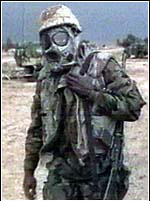 Vets want the U.S. to recognize health problems as service-related
Vets want the U.S. to recognize health problems as service-related
by Mike Barber
Veterans of the 1991 Persian Gulf War felled by a disproportionate number of neurological disorders are picking themselves up for one last hurrah.
The fight this time involves summoning up the energy to turn out to address in a congressional hearing this month government funding and response to their needs after exposure to an array of toxins during and after the first war against Iraq.
“It’s our last chance to stand up together because many of us are so ill,” says Julie Mock of Bothell, president of the National Gulf War Resource Center, herself afflicted with the fatigue and pain of service-connected multiple sclerosis.
A flurry of activity followed after a Seattle Post-Intelligencer story in August documenting how Mock and a growing number of fellow 1991 Gulf War veterans suffer from multiple sclerosis, though not all may be recognized as having service-related illnesses.
The story included an account from Liz Burris of Tacoma, a Desert Storm veteran and former Fort Lewis Army officer whose multiple sclerosis also is service-connected. Burris now is co-founder of MSVets.com, a Yahoo! Web site that has attracted nearly 500 Gulf War veterans nationwide who display symptoms of multiple sclerosis…
Persian Gulf War veterans were galvanized to sign up to testify at the hearings before Congress on Nov. 15 to push for an additional $10 million in funding for Gulf War veterans’ illnesses research, Mock said.
Meanwhile, the Northwest chapter of the Paralyzed Veterans of America last month unanimously passed a motion asking the national organization to back the cause of veterans of that war who now display symptoms of multiple sclerosis.
Of the 700,000 U.S. troops who served in the Persian Gulf in 1991, a disproportionate number have come down with serious neurological disorders. More than 65 percent have sought health care for service-related ailments. Nearly 200,000 are receiving disability compensation — twice the rate as vets from World War II, Korea and Vietnam.
Veterans point to a lineup of potential suspects behind their afflictions: disease-carrying sand fleas, anti-biological warfare pills and a poison plume covering a wide area after U.S. troops inadvertently incinerated Iraqi rockets containing sarin, a nerve gas, at Khamisiyah, Iraq.
Brain-cancer deaths; amyotrophic lateral sclerosis, commonly known as Lou Gehrig’s disease; and fibromyalgia which all attack the nervous system, are now linked by Pentagon and national Institute of Medicine studies to 1991 service in the Persian Gulf.
Mock, Burris and others call for mass screenings and widening the window in which veterans can apply for disability benefits, especially for multiple sclerosis.
Unless veterans document symptoms within seven years of discharge, as Mock and Burris knew to do, they might not qualify as having service-connected disabilities.
The federal government this summer began notifying about 300,000 veterans of the possibility of brain cancer being linked to units exposed to the plume of sarin in 1991.
The Nov. 15 hearing before the House Government Reform Committee’s subcommittee on national security will consider a bipartisan amendment to the 2006 Defense Appropriations Bill co-sponsored by U.S. Reps. Dennis Kucinich, D-Ohio, the ranking minority member, and Bernard Sanders, an independent from Vermont.
The amendment would earmark $10 million from the Army to uncover physiological mechanisms behind Gulf War diseases.
U.S. Rep. Christopher Shay, the Connecticut Republican who heads the subcommittee, already has held 17 hearings on Gulf War veterans’ illnesses over the last decade. He has said that those veterans have persisted in the face of “entrenched indifference and bureaucratic inertia” to prove post-war illnesses connected to exposures to various toxins in wartime.
In Seattle, Michael Killen, a Marine Corps veteran of the 1991 Gulf War, said the upcoming congressional hearings “are very important because so many people who served overseas in that war came down with MS.”
They need the government to look outside the seven years from date of discharge in which evidence of a disability can be linked to service, said Killen, who now helps other veterans.
“I know a number of 1991 veterans outside the seven-year presumptive period that are frustrated with the whole system altogether,” he said.
HAVE YOUR SAY
Persian Gulf War veterans say fellow veterans who cannot sign up to attend the Shay committee hearings can send testimony online to Kristine.McElroy@mail.house.gov.
The record will remain open for two days after the hearing. All written testimony will be entered into the Congressional Record. Name, contact information, branch, dates served and a statement of the event that occurred, problem resulting from that action and proposed solution should be included.
ATTENTION READERS
We See The World From All Sides and Want YOU To Be Fully InformedIn fact, intentional disinformation is a disgraceful scourge in media today. So to assuage any possible errant incorrect information posted herein, we strongly encourage you to seek corroboration from other non-VT sources before forming an educated opinion.
About VT - Policies & Disclosures - Comment Policy



